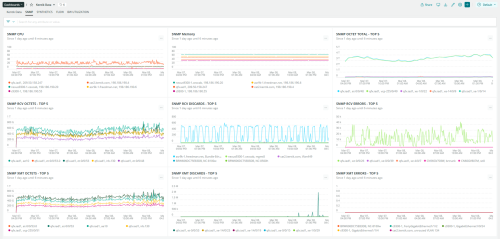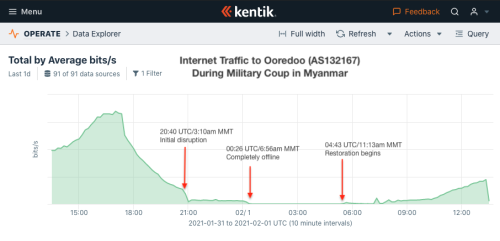From Egypt to Uganda, A Decade of Internet Shutdowns
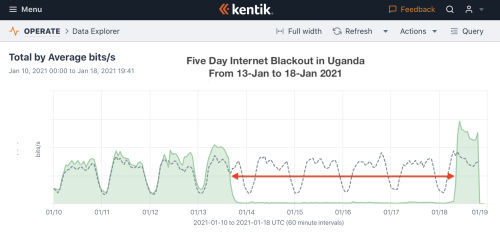
Summary
The shutdown in Egypt not only shifted the dynamics of protest in the 21st century, it was a watershed moment for the internet community — from technical organizations like Renesys to digital rights advocacy groups like Access Now. The era of the large-scale government-directed internet shutdown had truly begun.
The following is a joint blog post by Doug Madory (Kentik, previously with Renesys) and Peter Micek (Access Now).
Ten years ago today, a team of computer scientists at internet monitoring firm Renesys began frantically documenting and reporting about a massive internet shutdown in Egypt. At the same time, digital rights organization Access Now was scrambling to assist Egyptian activists circumventing surveillance and blockages of internet communications.
The Arab Spring had begun and longtime Egyptian President Hosni Mubarak was under siege by protests in Tahrir Square. In an ill-fated move, the government gave the order to cut internet services in an attempt to squelch the uprising. No longer able to follow the protests online, the shutdown brought more Egyptians into the streets to see what was happening, adding to the crowds. Ultimately, the internet in Egypt was restored, Mubarak resigned, and little else in Egypt was ever resolved.
Graphics generated by Renesys (left) and by New York Times (right) in 2011.
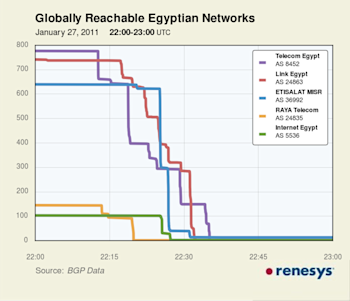
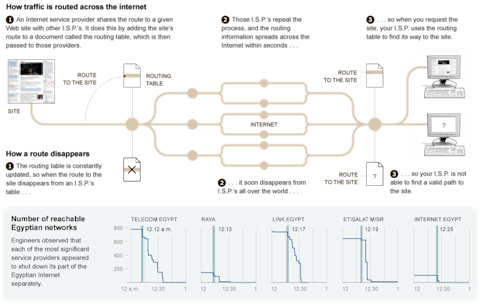
The shutdown in Egypt not only shifted the dynamics of protest in the 21st century, it was a watershed moment for the internet community — from technical organizations like Renesys to digital rights advocacy groups like Access Now. The era of the large-scale government-directed internet shutdown had truly begun.
In the past decade, the scourge of nation-scale internet shutdowns has continued — largely migrating from the Arab Spring to Sub-saharan Africa as longtime rulers came up for reelection. Used as a technique to quash opposition, shutdowns have the pernicious effects of hiding human rights abuses as well as limiting the press and free speech. In addition, shutdowns can be costly from entire economies down to average citizens. But for an embattled ruler, these are often seen as the necessary price of maintaining power.
Governments had disrupted the internet prior to Egypt’s blackout in 2011. However, this event drew the world’s attention to the internet’s weak points and bottlenecks where a nation’s telecoms must answer to authorities’ whims. Access Now pressured multinational telecoms operating in Egypt to explain their roles in the Mubarak regime’s internet shutdown. Soon, the UN declared that human rights apply online as they do offline, and telecoms began to recognize that they impact people’s rights.
Yet Egypt’s internet shutdown proved a bellwether. The threats have multiplied, with more than 213 shutdowns recorded in 2019. Governments from Myanmar to Cameroon adapted their tactics, blocking for more prolonged periods, in ways more targeted to stifle the voices of specific populations, such as refugees living in Bangladesh’s Cox’s Bazar camp, and people in marginalized and vulnerable ethnic, religious, or political groups.
As shutdowns rose globally, Access Now and partners launched #KeepItOn in 2016, a campaign and coalition that has grown to more than 220 organizations in 99 countries.
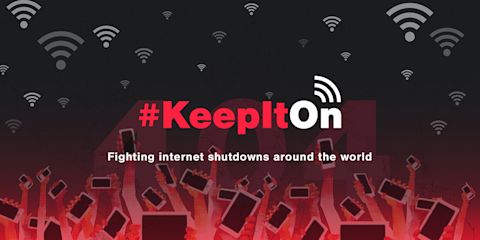
Additionally, in the past decade there has been an increasing need for the technical portion of the internet community to use their expertise, data, and tools to support the work of digital rights NGOs like Access Now. This domain expertise helps to differentiate a blackout due to a submarine cable cut from one caused by a government-directed act of repression. In recent years, companies have fielded internet “weather maps” that would democratize internet analysis allowing average users to find evidence of internet interference.
Despite these efforts, the past week saw yet another national internet shutdown when the government of Uganda gave the order to cut internet services in the country during a national election. The country was almost completely offline for five days around the day of the vote, which resulted in the reelection of President Museveni extending his 36-year rule over the East African country. Sadly, the disruption came as little surprise to observers, who anticipated and tried to prevent the internet blocks.
The shutdown in Uganda shows that the effort to combat these acts is far from over and needs more support. Especially worrisome is the prospect that the conclusion other embattled authoritarian regimes may draw from Uganda is that shutdowns work, given the president’s re-election.
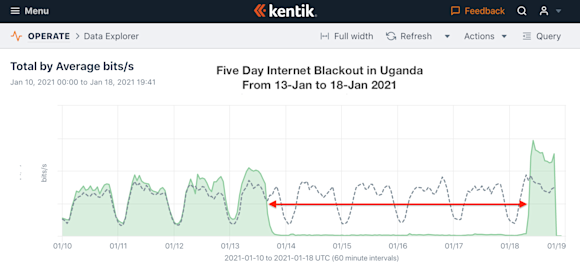
With ten years of hindsight, we can see that the Egyptian internet shutdown was not an anomaly, but rather a harbinger of things to come, namely, an era where internet communications would be directly threatened by repressive governments in an effort to control their own people.
Just like Renesys and Access Now did ten years ago, everyone has a role to play in exposing and resisting these disruptions. Legal challenges resulted in several courtroom victories against shutdowns in 2020. Civil society organizations can join #KeepItOn and deploy tools to measure internet censorship and share stories of living through shutdowns, calling on governments to #LetTheNetWork. Tech companies can collaborate against abusive government requests and governments can speak out when their peers violate norms. Join our fight, and you too can help build a stronger net.
